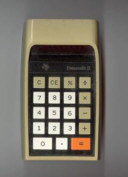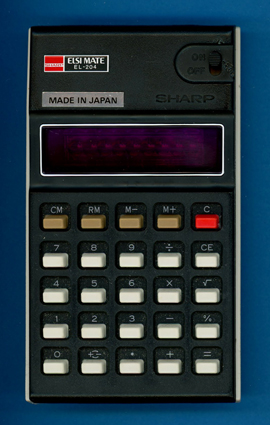
DATAMATH CALCULATOR MUSEUM
 |
DATAMATH CALCULATOR MUSEUM |
Sharp EL-204
| Date of introduction: | October 1976 | Display technology: | LED |
| New price: | Display size: | 8 | |
| Size: | 5.0" x 3.0" x 0.90" 128 x 75 x 23 mm3 |
||
| Weight: | 4.1 ounces, 117 grams | Serial No: | 6311589Y |
| Batteries: | 9V | Date of manufacture: | mth 12 year 1976 |
| AC-Adapter: | Origin of manufacture: | Japan | |
| Precision: | 8 | Integrated circuits: | TMS0956 (KGSΔ7642) |
| Memories: | 1 | ||
| Program steps: | Courtesy of: | Ken H. Meine | |
| Download manual: |
|

![]()
 At
first glance looks this early EL-204 calculator like a typical Sharp design of
the Seventies but sports a red LED display instead the more common green Vacuum
Fluorescent Display (VFD) known from many similar products of this timeframe.
At
first glance looks this early EL-204 calculator like a typical Sharp design of
the Seventies but sports a red LED display instead the more common green Vacuum
Fluorescent Display (VFD) known from many similar products of this timeframe.

 Dismantling
the featured EL-204 manufactured in December 1976 in Japan reveals a clean
design based on a single-sided printed circuit board (PCB) for the main
electronics and a double-sided PCB for the keyboard and powered by a disposable
9 Volts battery. Learn how to decipher the
6311589Y
Date code hidden in the serial number of the pictured
calculator.
Dismantling
the featured EL-204 manufactured in December 1976 in Japan reveals a clean
design based on a single-sided printed circuit board (PCB) for the main
electronics and a double-sided PCB for the keyboard and powered by a disposable
9 Volts battery. Learn how to decipher the
6311589Y
Date code hidden in the serial number of the pictured
calculator.

 Removing the PCBs from the calculator
housing divulges an unexpected surprise! The EL-204 makes use
of a Texas Instruments TMS0956 single-chip calculator circuit based on the TMS1000
Microcomputer family. The TMS0950
architecture was introduced in 1975 with the
TI-1200 and
TI-1250 and soon replaced with the
TMS0970, one of the most
successful calculator chip designs.
Removing the PCBs from the calculator
housing divulges an unexpected surprise! The EL-204 makes use
of a Texas Instruments TMS0956 single-chip calculator circuit based on the TMS1000
Microcomputer family. The TMS0950
architecture was introduced in 1975 with the
TI-1200 and
TI-1250 and soon replaced with the
TMS0970, one of the most
successful calculator chip designs.
 While the TI-1250 uses a 6x4 layout of the keyboard, changed the EL-204 the
layout into a 5x5 matrix adding the sqr(X) function. Reverse-engineering of the
EL-204 calculator demonstrates that the TMS0956 actually is scanning a 7x4
keyboard matrix, a previously unknown feature of the TMS0950 series.
While the TI-1250 uses a 6x4 layout of the keyboard, changed the EL-204 the
layout into a 5x5 matrix adding the sqr(X) function. Reverse-engineering of the
EL-204 calculator demonstrates that the TMS0956 actually is scanning a 7x4
keyboard matrix, a previously unknown feature of the TMS0950 series.
![]() The display module manufactured by Sharp of the EL-204 uses nine small LED chips bonded on
a substrate with an additional magnifying lens to enlarge the digits.
The display module manufactured by Sharp of the EL-204 uses nine small LED chips bonded on
a substrate with an additional magnifying lens to enlarge the digits.
If you have additions to the above article please email: joerg@datamath.org.
© Joerg Woerner, November 25, 2022. No reprints without written permission.